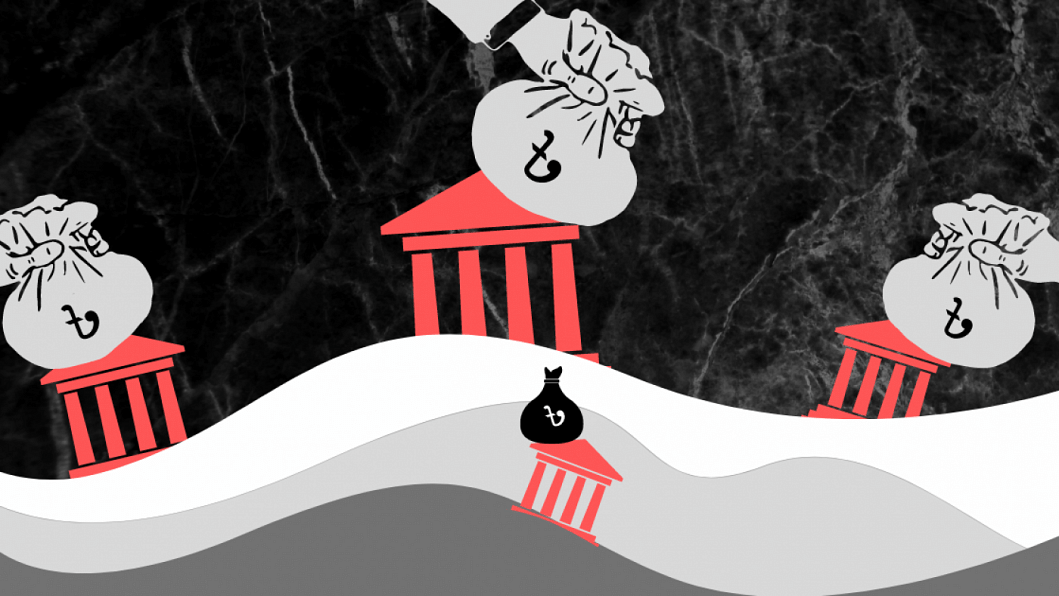Factors that may cause bank run in Bangladesh

Banks are in the business of borrowing short from surplus units and lending long to deficit units. This creates the problem of maturity mismatch and consequently banks face liquidity problem. Banks are largely dependent on trust which can be broken when they fail to honour the cheques of their depositors.
If depositors are gripped by collective distrust and decide to withdraw their deposits all at the same time in a short period, banks are unable to satisfy these withdrawals as their assets are mostly illiquid. This gives rise to "bank run". If run on a bank is not handled carefully, it may lead to bank failure—a situation where a bank is unable to meet its obligations to its depositors or other creditors because it has become insolvent.
Poor liquidity management or even rumours about a bank may lead to bank run. Notably, a run can occur whether the bank is insolvent or not—that is, the fear of a run may be enough to produce one. Therefore, the perceptions of depositors are clearly related with bank run.
Previous research discovered that the fear of losing one's savings is positively connected with individuals' behaviour during a bank run scenario. Studies showed that when depositors can be assured that banks are not facing a liquidity crisis, rather mismanagement of liquidity prevails in the banking system, they may postpone their withdrawal. In other words, postponement of deposit withdrawal will take place when depositors know that the banking system as a whole does not face any liquidity crisis. Deposit insurance reduces the probability of bank run as it guarantees depositors' savings in the banks. Although a full coverage by deposit insurance certainly eliminates bank run, partial deposit insurance cannot. Generally, deposit insurance reduces depositors' incentive to make a run on the bank.
At present, there are 61 banks in Bangladesh. There are six state-owned commercial banks (SCB), three specialised banks (SB), 43 private commercial banks (PCB) and nine foreign commercial banks (FCB). Among the private commercial banks, 33 are conventional and 10 Islami Shariah based. The country is overbanked which creates an unhealthy competition among banks. The banking sector of Bangladesh is engulfed with many problems that can initiate bank run. Yet no such research has been carried out that could provide a better understanding of the factors which cause bank run. It is essential to know the factors related to bank run, otherwise a major gap in risk management process will remain unexplored.
A recent study was carried out to discover the factors that may cause bank run in Bangladesh. It attempts to identify the factors that drive depositors' perceptions toward bank run. Personal interviews using closed-ended questions were used to collect data between July and October 2023 from 400 respondents of which 77 percent were from PCB and 23 percent from SCB.
More than half of the respondents (61 percent) were male and more than 57 percent had business education. A whopping 83 percent of the depositors were knowledgeable about the problems in the banking sector, including loan scams, high non-performing assets, shortage of capital deficiency and liquidity problems. A mere 36 percent of customers were familiar with deposit insurance scheme—a scheme of Bangladesh Bank (BB) which gives protection to deposits up to Tk 100,000 against each account.
The study found a significant relationship between category of education and bank run. Depositors with non-business education are 1.76 times more likely to run for cash withdrawal than depositors with business education because the former do not understand why banks face crises, the magnitude of crises and how they affect banks. Thus, they tend to run on deposits.
The research discovered an important connection between depositors' awareness of liquidity problem and bank run. The depositors who are not aware about liquidity problem are 1.74 times more likely to rush for cash withdrawal than those who understand the issue. Liquidity problem arises from maturity mismatch, high non-performing loans, mismanagement of funds and inability to obtain financing. Some are easily manageable while others are not. Hence, it is quite natural that the depositors, who are not familiar with the causes of liquidity problem, are more inclined to rush for cash withdrawal.
There is strong evidence that knowledge about banking sector problems and bank run are well associated. Depositors who know about banking sector's problems are 2.36 times more likely to rush for cash withdrawal than those who are not aware of the issues. Knowledge about banking sector problems make them more panicked, so they are more likely to make a run on the bank.
Finally, the research identified that bank run is affected by knowledge about deposit insurance scheme. Depositors who are unfamiliar with this system are 4.32 times more likely to run on deposits than people who know about the insurance scheme. A large number of depositors do not have any knowledge about this scheme, let alone its operational procedures.
The results have implications for bank regulations and financial crisis literature. Bank run as this research indicates can occur in Bangladesh and it is affected by some factors. In recent years, for example, some banks, that faced liquidity constrains, had to borrow from money markets at abnormally high interest rates. Other times they resorted to Bangladesh Bank (BB) finding no other alternatives.
For about the last five years, BB had to extend special credit support to some banks to help them overcome their liquidity problem. The central bank also requested people not to be panicked while several banks were in serious liquidity problem. BB had to assure people that no bank will fail in the country. All these initiatives were taken to avoid potential bank run. If those banks were not supported by BB, they would have faced bank run. Some of them might have failed too.
If several banks face losses simultaneously due to bank run, the government may fail to save them and rescuing them could be expensive. Thus, banks need to be efficient and resilient to avoid bank run. If run on deposits cannot be prevented ex ante it may create havoc in the entire economy ex post. People must also be educated and made aware about banking sector issues so that they are not driven by irrational behaviour that can cause bank run.
Dr Md Main Uddin is professor and former chairman of the Department of Banking and Insurance at the University of Dhaka. He can be reached at [email protected].
Views expressed in this article are the author's own.
Follow The Daily Star Opinion on Facebook for the latest opinions, commentaries and analyses by experts and professionals. To contribute your article or letter to The Daily Star Opinion, see our guidelines for submission.

 For all latest news, follow The Daily Star's Google News channel.
For all latest news, follow The Daily Star's Google News channel. 










Comments